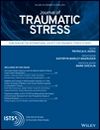ESPT Pompiers – Deux articles sur l’ESPT chez les pompiers dans le dernier numéro de Journal of Traumatic Stress
 Duty-Related Trauma Exposure and Posttraumatic Stress Symptoms in Professional Firefighters
Duty-Related Trauma Exposure and Posttraumatic Stress Symptoms in Professional Firefighters
Junghyun H. Lee, Dayoung Lee, Jiae Kim, Kyoungsun Jeon, Minyoung Sim
Volume 30, Issue 2, April 2017, Pages 133–141
Abstract
Firefighters commonly encounter traumatic events during duty hours. The purpose of this study was to investigate the characteristics of duty-related trauma as risk factors for posttraumatic stress disorder in professional firefighters. A sample of 212 firefighters participated in the study and completed self-reported questionnaires. Potentially traumatic events (PTE) were assessed using a list of 17 traumatic event types. The posttraumatic stress symptoms (PTSS) were measured by the Impact of Event Scale-Revised (Lim et al., 2009; Weiss, 2007). A higher score for the composite index, which reflects both multiple PTE and peritraumatic suffering, increased the odds for significant PTSS after adjusting for age, sex, marital status, education, numbers of years worked, childhood trauma, and depressive symptoms (adjusted odds ratio [AOR] = 2.26, p = .001, Cohen’s d = 0.20). Furthermore, indirect (AOR = 1.93, p = .009, Cohen’s d = .16) and colleague-related PTE (AOR = 1.97, p = .037, Cohen’s d = .16) showed significant associations with PTSS. It is noteworthy that the combination of multiple PTE and peritraumatic suffering was more predictive of PTSS than either factor alone. Our findings also suggest that daily work exposure to indirect PTE may contribute to the occurrence of PTSS among professional firefighters.
 The Amplification of Common Somatic Symptoms by Posttraumatic Stress Disorder in Firefighters
The Amplification of Common Somatic Symptoms by Posttraumatic Stress Disorder in Firefighters
Josie S. Milligan-Saville, Helen M. Paterson, Emily L. Harkness, Annabel M. Marsh, Mark Dobson, Richard I. Kemp, Richard A. Bryant, Samuel B. Harvey
Volume 30, Issue 2, April 2017, Pages 142–148
Abstract
Posttraumatic stress disorder (PTSD) in emergency service personnel and other trauma-exposed populations is known to be associated with a variety of physical health problems. However, little attention has been paid to the health of ageing emergency service personnel, who may be forced into early medical retirement because of a combination of these issues. Currently employed (N = 274) Australian firefighters completed a cross-sectional survey using validated, self-report measures of PTSD and somatic symptoms. Analyses examined the association between probable PTSD and a range of common somatic symptoms, and whether any association differed depending on the age of the firefighters. Firefighters with PTSD reported greater levels of neurological (p = .024), gastrointestinal (p = .015), and cardiorespiratory (p = .027) symptoms compared to those without PTSD. After adjusting for sex, age, and rank, linear regression analysis demonstrated that PTSD was significantly associated with increased total somatic symptom severity (p = .024), with PTSD accounting for 9.8% of the variance in levels of somatic symptoms. There was no interaction between age and the association between PTSD and somatic symptom severity. These results suggest that PTSD is associated with a significant increase in a wide range of somatic symptoms among firefighters, regardless of age. The implications for the identification and treatment of PTSD are discussed.
